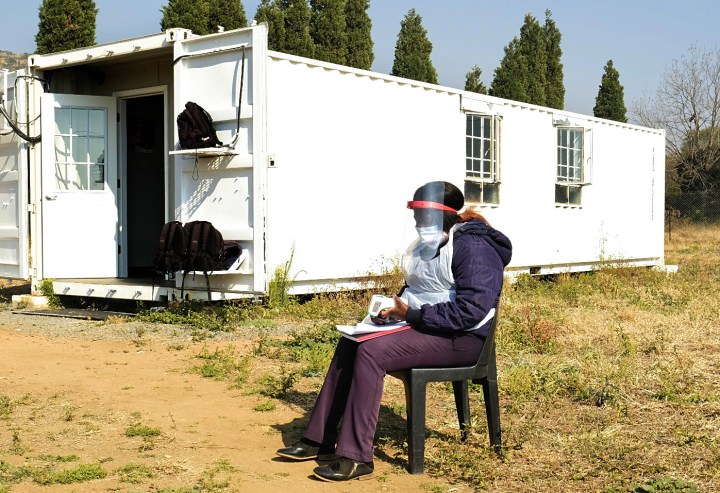Maverick Citizen Op-ed
Taking from Peter to pay Paul: A walk through the government’s special Covid-19 budget

On 24 June, Finance Minister Tito Mboweni tabled a supplementary budget in response to the president’s call for a fiscal package to support national Covid-19 interventions. But although this was aimed at alleviating a health crisis, the budget is, ironically, not good for the nation’s health services.
Tlamelo M Mothudi
Public finances in South Africa were already in a critical state before the Covid-19 pandemic , but a new level of instability has now been reached, according to the National Treasury as outlined in its Covid-19 2020 supplementary budget documents. This is further substantiated by the fact that the current cost of servicing debts equates to 12% of total spending, which is equivalent to the amount that is being spent on healthcare services.
In April 2020, President Cyril Ramaphosa assured the nation that an additional R20-billion would be diverted to the health response. However, the Budget Justice Coalition has pointed out how, in the supplementary budget, the R21.5-billion package directed at healthcare is not made up of new funds, but will rather come from a combination of reprioritisation and new funds.
Only R2.9-billion of the R21.5-billion is extra funding from the treasury. This, while the provinces are expected to source R18.6-billion from their existing 2020 budgets.
The table below shows the provincial equitable shares for health, indicating the amount which each province has agreed to reprioritise: overall, R15-billion is reprioritised and directed towards increasing capacity in the public health system to address the Covid-19 crisis.
| Province: | Funds reprioritised to health: R thousand |
| Eastern Cape | 1 988 374 |
| Free State | 835 589 |
| Gauteng | 3 126 485 |
| Kwa-Zulu Natal | 3 105 174 |
| Limpopo | 1 735 434 |
| Mpumalanga | 1 228 288 |
| Northern Cape | 396 847 |
| North West | 1 045 383 |
| Western Cape | 1 538 426 |
| Total | 15 000 000 |
According to the Supplementary Budget Review (page 18), the funds needed for purposes of reprioritisation will come from activities cancelled due to restrictions on economic activity, and postponing the implementation of early-stage projects until 2021/22.
What of conditional grants?
The reprioritisation of provincial budgets will be complemented by the reprioritisation of provincial conditional grants in the sum of R7-billion. According to the Budget Review (page 40), the framework for conditional grants has been expanded to allow them to be used for Covid-19 response activities.
Certain conditional grant allocations, including those intended for school, municipal and hospital infrastructure, will be suspended. The suspension is intended to enable the funding of the Covid-19 response in various sectors and spheres of government. However, the adjustments to conditional grants will result in the delay of planned projects for the 2020 financial year. This means, for instance, that for the health facilities revitalisation grant, there will be less money available to maintain and repair health facilities.
The difference between indirect and direct conditional grants is that in the case of an indirect grant, the grant funds are spent by a national department on behalf of a province/municipality; in the case of a direct grant, the province/municipalities spend the grant in their own capacity.
For direct conditional grants, the transfer to the provinces of R49.2-billion was adjusted to R52.1-billion with an amount of R1.9-billion repurposed within. The HIV, TB, malaria and community outreach grant has had a Covid-19 component added, with an amount of R2.8-billion being allocated for screening and contact tracing.
For the indirect conditional grant on the National Health Insurance, the transfer to the provinces in the 2020 budget of R2.2-billion saw a decrease of R338-million, resulting in an adjustment of R1.9-billion with R200-million being repurposed.
The supplementary budget and the state of healthcare – what about Paul?
Even before the pandemic, the healthcare sector in South Africa needed urgent intervention and reform to ensure equitable healthcare for all, in line with section 27 of the Constitution. The weaknesses of the healthcare sector have been further exposed, with some questioning whether the system will be able to cope with the increased pressures of Covid-19.
The funds needed to ensure a responsive health system will mostly come from provincial budgets, which must still continue to accommodate service delivery needs. As such, the supplementary budget fails to outline where the additional funds from the provincial budgets will come from, and which service delivery needs will be prioritised over others. In addition, the costs of medico-legal claims currently stands at R99.2-billion in contingent liabilities as of the 2018/19 financial year, with payments at R2-billion.
There will always be concerns where funds that are allocated for service delivery – whether by way of equitable share or conditional grants – have to be reprioritised, even if it means going towards fighting Covid-19.
Inevitably, reprioritisation means that certain services won’t be delivered in provinces where the need is often greatest. This could well come back to haunt the health system down the line. DM/MC
Tlamelo M Mothudi, Health Researcher : Public Service Accountability Monitor (PSAM), School of Journalism and Media Studies, Twitter: @PSAM_AFRICA
"Information pertaining to Covid-19, vaccines, how to control the spread of the virus and potential treatments is ever-changing. Under the South African Disaster Management Act Regulation 11(5)(c) it is prohibited to publish information through any medium with the intention to deceive people on government measures to address COVID-19. We are therefore disabling the comment section on this article in order to protect both the commenting member and ourselves from potential liability. Should you have additional information that you think we should know, please email [email protected]"




 Become an Insider
Become an Insider